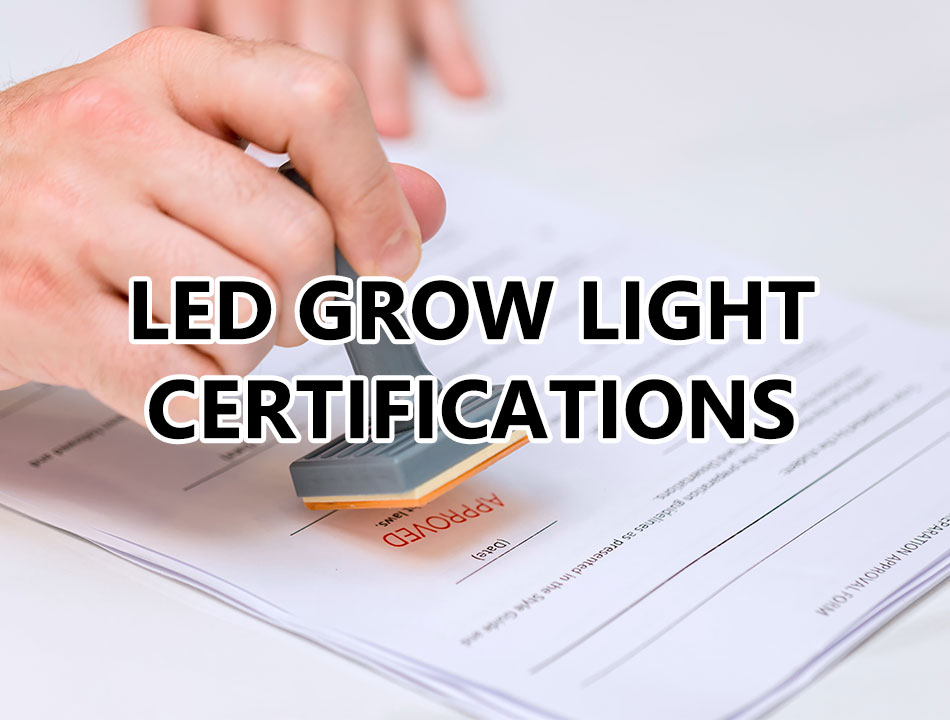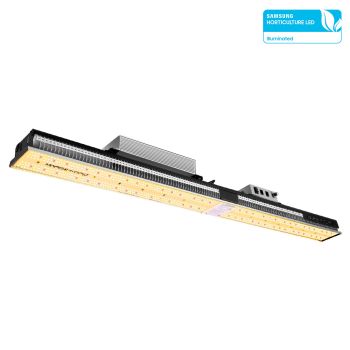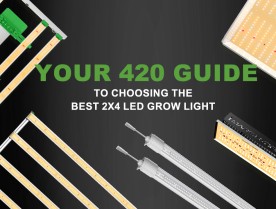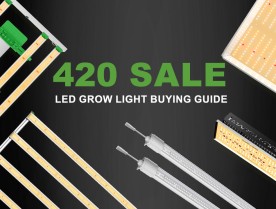
LED grow lights have become increasingly popular in recent years as more people turn to indoor gardening. These lights can be a great way to provide the necessary light for plant growth without relying on natural sunlight. However, not all LED grow lights are created equal, and it's important to look for products that meet certain safety, quality, and efficiency standards as horticultural lighting equipment or agricultural lighting solutions.
One way to ensure that an LED grow light meets these standards is to look for certifications. Here are eight certifications to look for when shopping for an LED grow light and what they mean.
LED Grow Light Certifications to Ensure Safety
There are three commonly seen safety certifications for led grow lights that are particularly important to ensure that the products are safe for use in indoor horticultural applications and meet relevant safety standards.

UL (Underwriters Laboratories),ETL (Electrical Testing Laboratories), andCE (Conformité Européenne) certifications are primarily safety certifications providing assurance that the products meet specific safety and quality standards and have been independently tested and certified by accredited laboratories, and comply with relevant regulations and standards in the intended market.To achieve these certifications, an LED grow light must undergo thorough comprehensive testing and evaluation, including assessments of electrical safety, mechanical properties, environmental performance, energy efficiency, and other relevant criteria.
What are the differences between UL, ETL, and CE? As they are all certifications that indicate compliance with safety and quality standards? To learn them in detail:
-
Geographical Recognition:
-
UL: In addition to the United States, widely recognized in many other countries around the world, including Canada, Mexico, Europe, and parts of Asia.
-
ETL: Recognized and accepted in North America, including the United States and Canada, and also has a global presence.
-
CE: Mandatory certification for products sold in the European Economic Area (EEA), which includes all EU member states as well as Iceland, Norway, and Liechtenstein.
-
-
Scope and Coverage:
-
UL: Provides comprehensive testing and certification services across various industries, including lighting, appliances, electronics, and more. Offers specific certifications like UL 8800 for horticultural lighting.
-
ETL: Offers testing and certification services across multiple industries, similar to UL, including lighting, appliances, electronics, and more. Also provides specific certifications for horticultural lighting products.
-
CE: Covers a wide range of products and applies to various industries, including machinery, electronics, toys, medical devices, and construction products.
-
-
Regulatory Requirements:
-
UL: Ensures compliance with safety standards set by Underwriters Laboratories (UL) and relevant industry-specific standards.
-
ETL: Ensures compliance with safety standards set by Intertek Testing Services and relevant industry-specific standards, similar to UL.
-
CE: Requires compliance with relevant European Union (EU) directives, including health, safety, and environmental regulations applicable to products sold in the EEA.
-
-
Examples of Recognized Organizations:
-
UL: Occupational Safety and Health Administration (OSHA), Standards Council of Canada (SCC), National Institute of Standards and Technology (NIST), National Voluntary Laboratory Accreditation Program (NVLAP), International Electrotechnical Commission (IEC)
-
ETL: Accredited by several recognized organizations, including the Occupational Safety and Health Administration (OSHA), the Standards Council of Canada (SCC), and the National Voluntary Laboratory Accreditation Program (NVLAP), American National Standards Institute (ANSI), International Electrotechnical Commission (IEC).
-
CE: European Committee for Standardization (CEN), European Committee for Electrotechnical Standardization (CENELEC), European Telecommunications Standards Institute (ETSI), European Chemicals Agency (ECHA), European Aviation Safety Agency (EASA).
-
UL 8800 Horticultural Listing

UL has developed a specific certification for horticultural lighting equipment called UL 8800, which is designed to address the unique safety concerns related to horticultural luminaires, horticultural lighting components, and grow systems. This certification sets standardized safety requirements for grow lighting solutions that are intended for use in indoor cultivation environments, including greenhouses and other moist and warm spaces. The UL 8800 certification indicates that the technology used in the LED grow lights is safe for both the operator and the plants, even in high-demand environments where the fixtures may be operating continuously. UL8800 gives growers peace of mind that they are using safe and reliable lighting systems for their horticultural needs.
RoHS Compliance (Restriction of Hazardous Substances)
RoHS is not a certification but rather a directive issued by the European Union that restricts the use of certain hazardous materials in electrical and electronic equipment. The directive was introduced in 2003 and became law in the EU in 2006. The purpose of RoHS is to reduce the environmental impact of electronic waste and to protect the health and safety of individuals who handle such equipment.
RoHS restricts the use of six hazardous substances in electronic equipment, including lead, mercury, cadmium, hexavalent chromium, polybrominated biphenyls (PBBs), and polybrominated diphenyl ethers (PBDEs). Products that comply with RoHS must contain no more than the maximum concentration values of these substances.
RoHS compliance is mandatory for products sold in the European Union, but it has also become a global standard, with many countries and regions adopting similar regulations. RoHS compliance is typically indicated by a RoHS symbol on the product or its packaging.
LED Grow Light Certifications To Ensure Energy Efficiency
Energy efficiency certifications are essential for grow lights as they can help growers reduce their energy bills while minimizing their carbon footprint.

Energy Star Certification
Energy Star is a certification program established by the U.S. Environmental Protection Agency (EPA) to promote energy efficiency in products and reduce greenhouse gas emissions. The program sets energy efficiency standards for a wide range of consumer products, including LED lighting, electronics, appliances, and more.
Products that meet Energy Star requirements are designed to use less energy and help consumers save money on their utility bills, while also reducing their environmental impact. Energy Star-certified LED lighting products, including grow lights, must meet stringent performance criteria related to energy efficiency, color quality, and output. In addition to helping consumers make more informed purchasing decisions, Energy Star also partners with businesses and organizations to promote energy-saving practices and reduce energy waste.
Energy Star Certified LED Horticultural Lighting Promises:
-
Up to 90% less energy than incandescent lighting
-
Lasts 35 to 50 times longer than incandescent lighting and about 2 to 5 times longer than fluorescent lighting
-
A minimum warranty of 3 years
-
Available with dimming on some indoor models and automatic daylight shut-off and motion sensors on some outdoor models
-
Light output remains constant for at least 35,000 hours
When LED luminaires are Energy Star certified, it indicates that the lighting fixtures are efficient retrofit options from traditional light sources to optimize plant growth with less energy waste.
DLC Certification (DesignLights Consortium)
The DesignLights Consortium (DLC) is a non-profit organization that promotes energy-efficient lighting solutions by establishing and maintaining quality, performance, and efficiency standards for lighting products. The DLC certification is a voluntary program that verifies the energy efficiency of LED lighting products, including LED grow lights, based on industry-standard performance criteria. The certification ensures that LED grow lights meet specific requirements for energy efficiency, light output, color quality, and other performance factors.
Qualified Products Listing (QPL)
LED grow lights that meet DLC standards are listed on the organization's Qualified Products List (QPL), which is a database of energy-efficient lighting products. To be eligible for inclusion on the QPL, LED grow lights must meet certain performance criteria, such as a minimum efficacy rating, minimum color rendering index (CRI), and maximum lumen depreciation. The product must also meet specific requirements for safety, reliability, and quality, as outlined in DLC's technical requirements. Manufacturers of LED grow lights can apply to have their products listed on the QPL, which can provide them with additional exposure and credibility in the industry.
Additionally, many utility companies offer rebates and incentives to customers who purchase DLC-listed products, which can help offset the initial cost of investing in energy-efficient LED grow lights.
LED grow lights included in the Qualified Products List meet the following criteria:
-
Photosynthetic Photon Efficacy : ≥1.9 µmol/J, with -5% tolerance within the PAR range (400-700nm)
-
The average photosynthetic photon flux maintenance rate > 90% after at least 36000h of use within the PAR range (400-700nm)
-
Specific design specifications include the exclusion of externally supplied active cooling systems, including forced air and circulating liquid.
-
Be certified by a relevant safety inspection organization in either the US or Canada. (UL, ETL, etc)
-
Power Factor : ≥0.9 conform to the electrical test ANSI/IES LM-79
-
A warranty of at least 5 years
By selecting DLC-listed products, growers can be confident that they are making a sound investment in their indoor growing operation, while also contributing to a more sustainable and energy-efficient future.
IP Rating (Ingress Protection)

IP Rating, or Ingress Protection Rating, is not a certification but rather a standardized system that classifies the degree of protection provided by electrical enclosures, including LED grow lights, against intrusion, dust, and moisture. It is expressed in the form of "IP" followed by two digits, with the first digit indicating the level of protection against solid objects, and the second digit indicating the level of protection against liquids.
Some common IP Ratings and their meanings:
-
IP20: provides protection against solid objects greater than 12.5mm in diameter, but offers no protection against water or moisture.
-
IP44: provides protection against solid objects greater than 1mm in diameter and splashing water from any direction.
-
IP65: provides protection against dust, dirt, and other solid objects, and low-pressure water jets from any direction.
-
IP67: provides complete protection against dust and dirt, and protection against immersion in water up to 1 meter for 30 minutes.
-
IP68: provides complete protection against dust and dirt, and protection against continuous immersion in water under specified conditions.
For LED horticultural lighting equipment, IP Rating is an important consideration as they may be used in environments where there is exposure to moisture, dust, and other particulates. A higher IP Rating means that the light is more resistant to these factors, and thus, less likely to experience damage or malfunction. It also ensures safety for the user as it prevents any contact with electrical components.
For example, an LED grow light with an IP Rating of IP65 would be able to withstand water jets and have limited dust ingress, making it suitable for outdoor use in wet environments. Meanwhile, an LED grow light with an IP Rating of IP44 would be protected against solid objects larger than 1mm and splashing water, making it suitable for indoor use.
To Round Up

In conclusion, LED grow light certifications play a crucial role in ensuring that consumers receive high-quality, energy-efficient, and safe products. These certifications not only provide assurance of product quality but also help consumers to make informed choices when selecting LED grow lights for their indoor gardens. Whether it's UL, ETL, CE, DLC, Energy Star, IP rating, or any other certification, each one has specific requirements and promises that help to improve the overall performance of LED grow lights. As the demand for indoor gardening continues to grow, it's essential to ensure that LED grow lights are certified and meet the necessary standards to create a sustainable and efficient indoor gardening environment.










